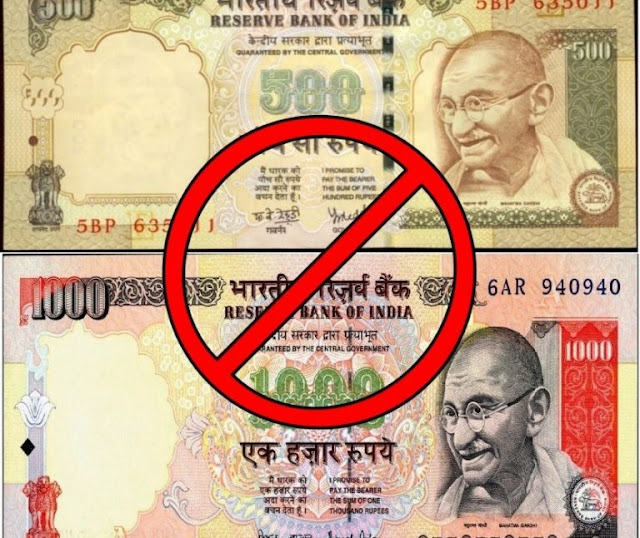Demonetization
has been defined as the act of stripping an old currency unit of its
value as legal tender, in order to introduce new units in to the
financial system. The Indian government has recently taken the
gigantic step of demonitizing its 500 and 1000 rupee notes, a move
which has been hogging the limelight since then. The government
claims it is a move to stem the tide of black money or an underground
and parallel system which has been sapping the growth of economy,
along with some other associated benefits in the short and long term.
It is being debated with equal fervour by the opposition parties who
seem to have arrived at common ground and hope to make it suitably
uncomfortable for the government in order to have an upper hand on
other issues.
The
said currency notes totalled a whopping 86% of extant currency in
India, and the move to demonitize these have made an immense impact
on a cash driven economy like India. Most transactions in India are
dependant on cash; these include small transactions such as grocery
and daily needs shopping, transport, medicare, payment of utility
bills such as electricity, gas and water, and larger transactions
such as bullion trading, stock market trading, real estate and
property. Reasons for the continuation of cash based transactions is
the poor penetration of banking services in the hinterland, and urban
centres using cash to escape lawful taxation on money heavy
activities. Willy nilly there are enough loopholes perpetrated by the
financial system that are sought to be exploited by using underhand
methods such as these.
The
present government under Prime Minister Modi campaigned on a plank of
stringent anti- corruption measures and a promise to unearth the
black economy which it alleged was a direct result of illegalities
that the earlier dispensations allowed to burgeon during their watch.
In the present move the government ostensibly is living up to these
campaign promises. To the face of it the move to demonitize currency
in such a drastic manner seems to do precisely that; force people
sitting on large piles of currency to move it in to the banking
system or allow it to perish, create conditions to jump start at
least the basis of a cashless economy, and initiate measures to use a
sledgehammer on illegal transactions. The government promises that it
would also ease out inflation in the short term by sucking out the
liquidity in the financial system. However, and with ample reason,
the opposition parties seek to corner the government by portraying
the move as anti- people, and the fact that such a momentous decision
was taken without taking all parties on board and without adequate
preparatory steps. It would also reduce the economic growth of the
country simply because of the dwindling investment confidence in the
financial markets. Couple this with the outflows from emerging
markets such as India in the hope of a spike in the US Fed rates, and
the oposition has a watertight and sealed debate!
Both
sides of the argument seem to hold water but only in isolation.
While
the government took this step seemingly solely on the basis of its
commitment to eradicate a flourishing parallel economy, it has been
timed to coincide with important forthcoming elections in state
legislatures. In addition there are massive allegations that its own
minions were aware of this step and managed to convert their piles of
currency before the order came in to effect. Further that the
important mega business houses which support the ruling party were
warned off in advance thereby allowing them to take corrective
measures. Also most of the really colossal sums of black money exist
in other forms such as investments in tax havens abroad or bullion or
real estate and these are not remotely affected by a domestic move of
this nature. And most importantly, that in taking a politically timed
step such as this, the government completely overlooked the misery it
would cause the common man.
Similarly,
the opposition parties are known to be sitting atop massive piles of
currency which are used to affect outcomes during elections, these
are normally collected against promises to be kept post elections.
Naturally a sudden move which chops them at the base would engender
protest. Moreover the coalition which was ruling earlier had ample
time and opportunity to adopt stringent measures but they failed to
do so.
Naturally
in the cacophony of political voices the common man is left to fend
for himself. In the past two weeks or so, the country has seen a
number of deaths which emanate from a person's inability to get
adequate cash for daily life. Similarly other facets of life in India
have ground to a halt, but these seem to have no articulation in the
public debate. Tourists for example have been left high and dry.
Military personnel serving in difficult terrain with virtually no
access to banking facilities are finding it extremely hard to
maintain their families back home. People in Nepal, a neighbour state
which had agreed to honour Indian currency suddenly find themselves
up a gum tree. Nepalese citizens especially the Gurkhas who serve in
the Indian Army and are largely dependant on their salary to meet
their needs back home are completely asunder as to how to fulfill
their commitments back home.
Notwithstanding
the 'fors' and 'againsts' the motion that we hear on the media
generated hyperbole, what remains clear is that the government has
initiated a move without adequate preparation; possibly such a
stringent move could have been more carefully balanced out to ensure
minimal effect on the economy and the people. The coming months are
likely to witness more turmoil. Whether the ruling party garners
enough wins in the state legislatures is yet to be seen. Yes, given
the enormous Indian penchant for improvisation, needless to say the
black economy would find new ways to perpetuate itself!

